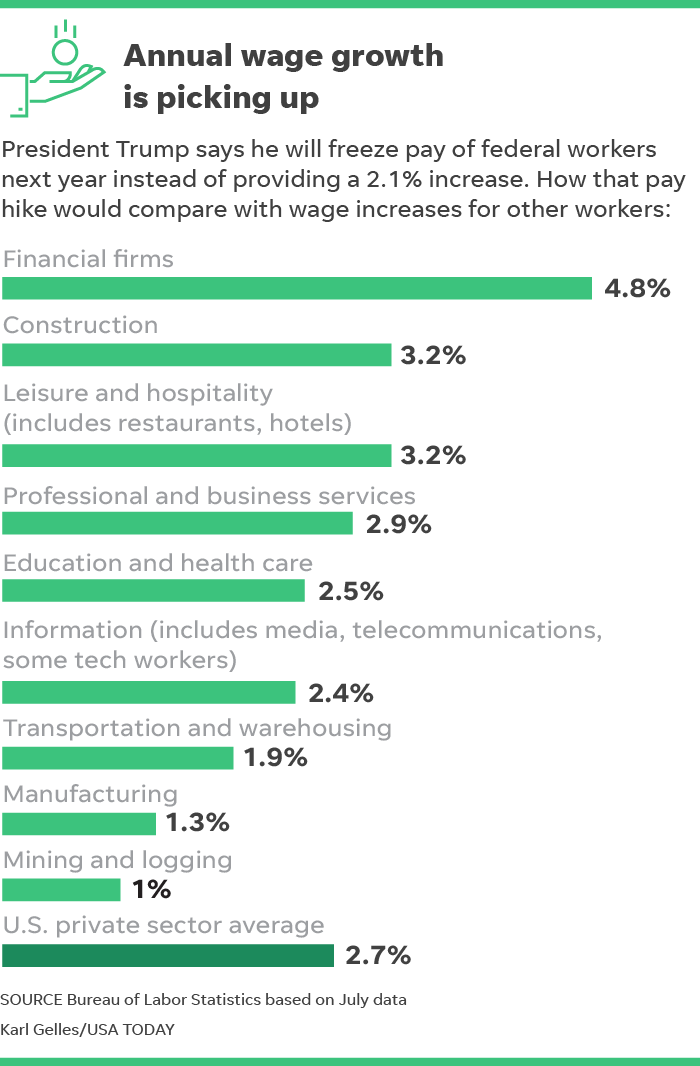
President Donald Trump’s decision to freeze the salaries of federal workers will make it harder for the government to recruit high-skilled employees amid growing labor shortages and faster private-sector pay increases, salary experts say.
“As wages firm in a very strong labor market, federal workers will be targeted by private-sector recruiters trying to poach talent,” says Andrew Chamberlain, chief economist of Glassdoor, the job-search and employee review site. “There are potentially big consequences.”
Trump told Congress on Thursday he’s canceling a scheduled 2.1 percent raise for the federal workers, citing the need “to put our nation on a fiscally sustainable course.”
Trump instead called for more merit pay increases.
Yet with unemployment near an 18-year low of 3.9 percent and the nation’s 6.7 million job openings hovering at a record high, private-sector pay increases have accelerated over the past year. Average hourly wages were up 2.7 percent in July from a year earlier, Labor Department figures show, while other measures suggest even faster hikes.
Wages were up 4.8 percent for financial firms, 3.2 percent in construction, 2.9 percent in professional and business services, and 2.5 percent in education and health services, according to the Labor Department. So even if the 2.1 percent federal pay increase took effect, the government would still be behind the curve.

President Barack Obama instituted a three-year pay freeze from 2011 to 2013. But Chamberlain notes that was just after a brutal recession. “Conditions are very different today,” he says. The economy is expected to grow a healthy 3 percent this year, and the labor market has been adding more than 200,000 jobs a month.
Some critics, however, say federal worker salaries already are too high. A Congressional Budget Office study last year found that from 2011 to 2015, federal workers with a high school diploma or less earned 34 percent more on average than similar private-sector workers. Federal workers with bachelor’s degrees earned 5 percent more than private-sector counterparts.
But federal workers with professional degrees or doctorates earned 24 percent less than similar employees in the private sector, the study found.
Overall, federal wages were 3 percent higher than private-sector pay for similar jobs. That’s partly because about 30 percent of federal workers belong to unions that bargain for higher wages, compared with just 11 percent of private workers.
“We have a gigantic deficit, and in general federal workers are overpaid,” says Chris Edwards, economist at the Cato Institute.
Chamberlain, however, says the figures show the government is especially at risk of being outbid for top-skilled workers who have advanced degrees, including NASA scientists and researchers at the Centers for Disease Control and Prevention.
Others note that salary isn’t the chief motivating factor for federal government workers. Benefits, particularly retirement and health care, are still far better for federal employees, notes Chris Martin, director of research for PayScale, a compensation data and software firm. The CBO study found average benefits for federal workers were 47 percent higher than similar private-sector workers. Martin also notes that federal workers often join the government for less tangible reasons, such as public service.
Yet Martin says the bigger problem is not the dollars and cents, but the psychological impact of workers who expected a pay hike having it taken away. That goes to the issue of fairness that most employees deem more significant, and it comes after Trump has leveled a string of putdowns at federal employees.





























